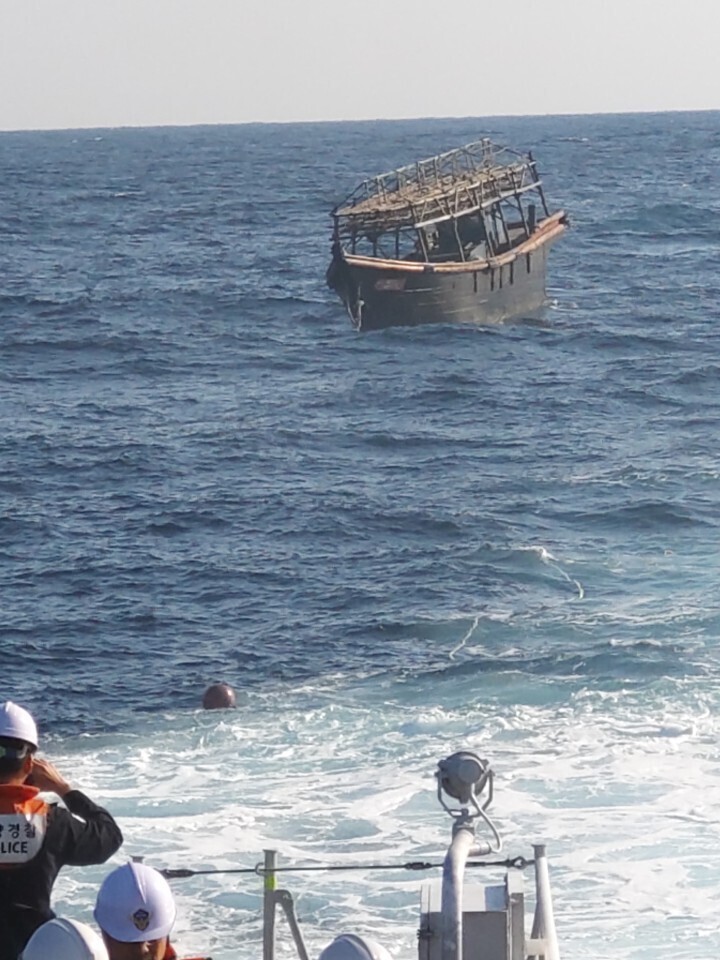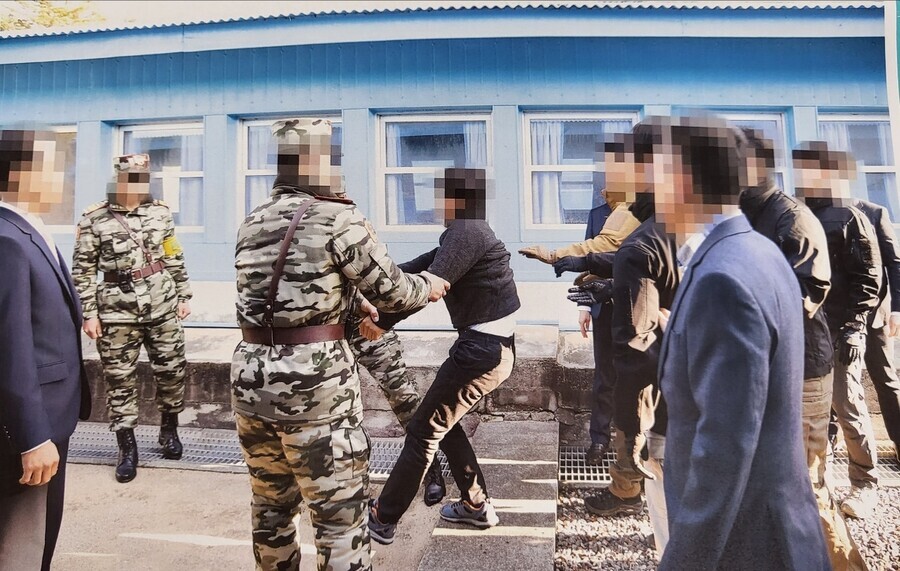hankyoreh
Links to other country sites 다른 나라 사이트 링크
[News analysis] How two NK fishers became center of clash between past, present S. Korean administrations

The South Korean government under President Yoon Suk-yeol described the previous administration’s decision to repatriate on Nov. 7, 2019, two North Korean fishermen who had slaughtered 16 members of their crew as “a crime against humanity and a violation of both international law and the Constitution” and promised to “learn the full truth about the incident.”
Korea’s National Intelligence Service (NIS) filed a criminal complaint against former NIS director Suh Hoon on July 6 for hastily closing an investigation into the repatriation of the North Korean fishermen, and the Ministry of Unification released photographs of their repatriation on Wednesday. Against that backdrop, the presidential office’s plan to determine whether the repatriation was a crime against humanity appears to constitute a declaration of “all-out war” against the preceding administration, which was led by former President Moon Jae-in.
“The image of one of the North Korean fishers’ desperate struggle not to be taken away is completely at odds with the Moon administration’s representation that they didn’t intend to defect to the South,” said Kang In-sun, spokesperson for the presidential office, when asked during a press briefing on Wednesday why a fact-finding investigation was necessary.
But Kang’s assertion doesn’t fit the facts. To begin with, the Moon administration never said at the time that the fishermen didn’t intend to defect. Eight days after their repatriation, the then-serving Unification Minister Kim Yeon-chul acknowledged before the National Assembly’s Foreign Affairs and Unification Committee that the fishers had “submitted in writing their intention to request protection.” But Kim added that “the government concluded that their request wasn’t sincere in consideration of all related facts, including their crime, their behavior within North Korean territory following the crime, and the circumstances of their capture.”
During that debate, lawmakers from the Liberty Korea Party (a prior incarnation of the People Power Party, the party to which Yoon belongs) focused their attack on the fact that the fishers had been repatriated “against their free will,” considering that they’d expressed their intention to defect in writing during their interrogation by the government.
The actual debate, therefore, is not whether the Moon administration engaged in lies and a coverup, but rather whether the government was right to conclude that the fishers weren’t sincere in their intention to defect. The primary reason the Moon administration reached that conclusion was that the fishers had evaded the South Korean Navy for three days (Oct. 31–Nov. 2, 2019) after crossing the Northern Limit Line instead of requesting protection.
Furthermore, the fishers had to be “subdued by force when special forces from the Navy entered [their vessel]” at the time of their apprehension, according to an answer Defense Minister Jeong Kyeong-doo gave to the National Assembly on Nov. 7, 2019. The fishermen also testified that they’d returned to the port of Kimchaek shortly after killing their crewmates, determined to “go back since if we had to die, we might as well die in the homeland,” and that they’d “thought about giving up on life” (i.e., killing themselves) when they were captured by South Korea, according to Kim Yeon-chul’s briefing to the Foreign Affairs and Unification Committee on Nov. 15 of the same year.
In light of those considerations, the Ministry of Unification officially briefed the Foreign Affairs and Unification Committee on Nov. 15 that it had “decided to deport the fishers after concluding that they’re vicious criminals who could threaten the lives and safety of the public and that they’re not sincere in their intention to defect.”
In deciding to repatriate the fishers, the ministry took into consideration the fact that “nonpolitical criminals who have committed murder or other serious crimes” are not eligible for asylum under international refugee law and are described as ineligible for protection under the North Korean Defectors Protection and Settlement Support Act. The ministry added that it wouldn’t be feasible to prosecute the fishers under domestic judicial procedures.
The government’s decision to repatriate the two squid fishers received support from Lee Hye-hoon, a lawmaker with the Liberty Korea Party and chair of the National Assembly’s Intelligence Committee at the time, who said she thought “it would be dangerous to set them loose in our society.”
But the Ministry of Unification has abruptly changed its stance. “The Unification Ministry holds the position that there is a clear problem with sending them [the fishers in question] back to North Korea, considering that the defected North Koreans are acknowledged as South Korean citizens under the Constitution and the various hardships they would face if they were handed over to North Korea,” ministry spokesperson Cho Joong-hoon told Korean and foreign reporters on Monday.
With a new administration in power, the ministry has changed its official stance, as seen in its altered language: “the deportation of North Koreans who committed a heinous crime” (November 2019) has now become “the forcible repatriation of North Korean fishers” (July 11, 2022).

The sharp divide between the Moon administration and Yoon administration’s view of the fishers’ repatriation, as well as the Ministry of Unification’s vacillation on its official position, are grounded in the ambiguity of inter-Korean relations symbolized by the clash between Articles 3 and 4 of the South Korean Constitution and in the absence of precedent for repatriating North Koreans.
Immediately after the two fishers were repatriated, the Liberty Korea Party savagely criticized the government’s decision as being “unconstitutional” on the grounds that “all North Koreans are citizens of the Republic of Korea because North Korea clearly falls within the territory of the Republic of Korea under the Constitution,” citing the territorial clause in Article 3.
More evidence marshaled to argue that repatriation was unconstitutional was a Supreme Court decision on Nov. 12, 1996, that North Koreans are citizens of the Republic of Korea. In that decision, the Supreme Court denied North Korea’s legal and political reality under Article 3.
Whereas the Supreme Court had formerly regarded North Korea as merely being an “anti-state organization,” it recognized the ambiguity of inter-Korean relations for the first time in a decision on Aug. 30, 2004, when it said that “North Korea is both a partner for dialogue and cooperation and an anti-state organization.”
Shortly after two inter-Korean summits, the Supreme Court went one step further with a ruling on April 17, 2008, in which it first explicitly acknowledged the normative force of Article 4, which expresses the principle of peaceful unification. Article 4 offers the constitutional grounds for acknowledging North Korea’s reality as a “partner for dialogue and cooperation.”
In effect, the Supreme Court has adjusted its interpretation of the Constitution as times have changed, just as the Constitutional Court has sought a balanced interpretation of Articles 3 and 4 while acknowledging the ambiguity of inter-Korean relations since 1993.
In the 2000s, the Constitutional Court (on June 30, 2005) and the Supreme Court (on Nov. 12, 2004) both ruled that North Korea can be regarded as equivalent to a foreign country and that North Koreans can be regarded as equivalent to foreigners.
This change in the high courts’ interpretation of the Constitution reflects the complex reality on the Korean Peninsula, in which the relationship between South and North is defined (in the inter-Korean basic agreement) as “not being a relationship between states” but constituting “a special interim relationship stemming from the process towards reunification,” even though the two sides are regarded by the international community as “independent sovereign states,” as reflected by their simultaneous and separate admission to the UN on Sept. 17, 1991.
But Yoon’s Ministry of Unification declared that the “defector fishermen are citizens of the Republic of Korea under the Constitution,” while citing the territorial language in Article 3. That basically ignores how the Constitutional Court and Supreme Court’s interpretation of the Constitution has changed since the 2000s.
“The controversy over repatriating the North Korean fishers is not a matter to be investigated and decided by the courts, but rather to be resolved through legislation and a constitutional interpretation that reflects the altered reality of inter-Korean relations,” noted a senior figure who has long been involved in inter-Korean relations.
Kim Yeon-chul told the National Assembly shortly after the two fishers’ repatriation that the ministry would “review and pursue legal and institutional improvements in the mid- and long term in connection with the criteria for heinous crimes, ensuring the objectivity of intent to defect, inter-Korean cooperation on criminal justice [that is, the extradition of criminals], and pertinent guidelines.” But no meaningful progress has been made since then.
By Lee Je-hun, senior staff writer
Please direct questions or comments to [english@hani.co.kr]

Editorial・opinion
![[Column] Season 2 of special prosecutor probe may be coming to Korea soon [Column] Season 2 of special prosecutor probe may be coming to Korea soon](https://flexible.img.hani.co.kr/flexible/normal/500/300/imgdb/original/2024/0426/3317141030699447.jpg) [Column] Season 2 of special prosecutor probe may be coming to Korea soon
[Column] Season 2 of special prosecutor probe may be coming to Korea soon![[Column] Park Geun-hye déjà vu in Yoon Suk-yeol [Column] Park Geun-hye déjà vu in Yoon Suk-yeol](https://flexible.img.hani.co.kr/flexible/normal/500/300/imgdb/original/2024/0424/651713945113788.jpg) [Column] Park Geun-hye déjà vu in Yoon Suk-yeol
[Column] Park Geun-hye déjà vu in Yoon Suk-yeol- [Editorial] New weight of N. Korea’s nuclear threats makes dialogue all the more urgent
- [Guest essay] The real reason Korea’s new right wants to dub Rhee a founding father
- [Column] ‘Choson’: Is it time we start referring to N. Korea in its own terms?
- [Editorial] Japan’s rewriting of history with Korea has gone too far
- [Column] The president’s questionable capacity for dialogue
- [Column] Are chaebol firms just pizza pies for families to divvy up as they please?
- [Column] Has Korea, too, crossed the Rubicon on China?
- [Correspondent’s column] In Japan’s alliance with US, echoes of its past alliances with UK
Most viewed articles
- 1‘We must say no’: Seoul defense chief on Korean, USFK involvement in hypothetical Taiwan crisis
- 2AI is catching up with humans at a ‘shocking’ rate
- 3The dream K-drama boyfriend stealing hearts and screens in Japan
- 4[Column] Can we finally put to bed the theory that Sewol ferry crashed into a submarine?
- 5S. Korea “monitoring developments” after report of secret Chinese police station in Seoul
- 6[Editorial] Yoon cries wolf of political attacks amid criticism over Tokyo summit
- 7Doubts remain over whether Yoon will get his money out of trip to Japan
- 8[Photo] “Comfort woman” survivor calls on president to fulfill promises
- 9[Editorial] Was justice served in acquittal of Samsung’s Lee Jae-yong?
- 101 in 5 unwed Korean women want child-free life, study shows